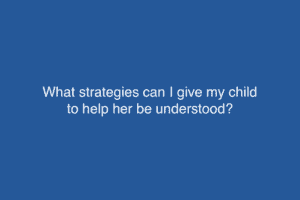
The next question is from a parent of an older child, who is asking “what kinds of strategies can I use to help my child when she can’t make herself understood?”
So, first of all, I think um, having a really open conversation with your child about how she feels, when she can’t make herself understood. And also letting her know how you feel, that you are so interested in what she has to say. And that you feel sometimes inadequate and-and you’re feeling badly that you can’t understand her. So, I think it’s really important that you both understand each other and have a conversation about the fact that you’re both trying really hard. She has a lot to say and you want to know, and understand, what she has to say. I think one of the things that I would recommend, since you said your-your child is an older child, is reaching out to a speech and language pathologist to see if there are any augmentative communication devices that your child might use, when she’s not able to make herself understood. You know there’s an emotional component to that as well, because, some young people don’t want to have to use some kind of augmentative device or augmentative system, even if it’s writing something down. Um, and you know that’s something that’s a discussion that you, and your child, and your speech and language pathologists would want to have. There are some low-tech devices, like having a pad of paper to be able to write down what she’s trying to say. And there are some high-tech solutions that are some computerized voice output solutions, that she could use um, to type into a device and the device would actually speak what she’s trying to say. So, again, that question is a little bit complex for someone who doesn’t know your child. I would be very happy to answer any more of your questions on this issue. If you would like to reach out to me by email, you can reach out to charrison@actlearningcentre.ca, center spelled the Canadian way so, c-e-n-t-r-e dot c-a and I’ll be happy to either give you, point you, towards some resources or perhaps point you towards somebody in your own community that might be able to give you a hand. But, thank you for asking that question. It’s an important question. It’s a question that we get often. And I think really what you’re trying to do is just help your daughter be a more effective communicator and feel successful at communicating her ideas. So I’ll help in any way that I can. I hope this has been helpful.



